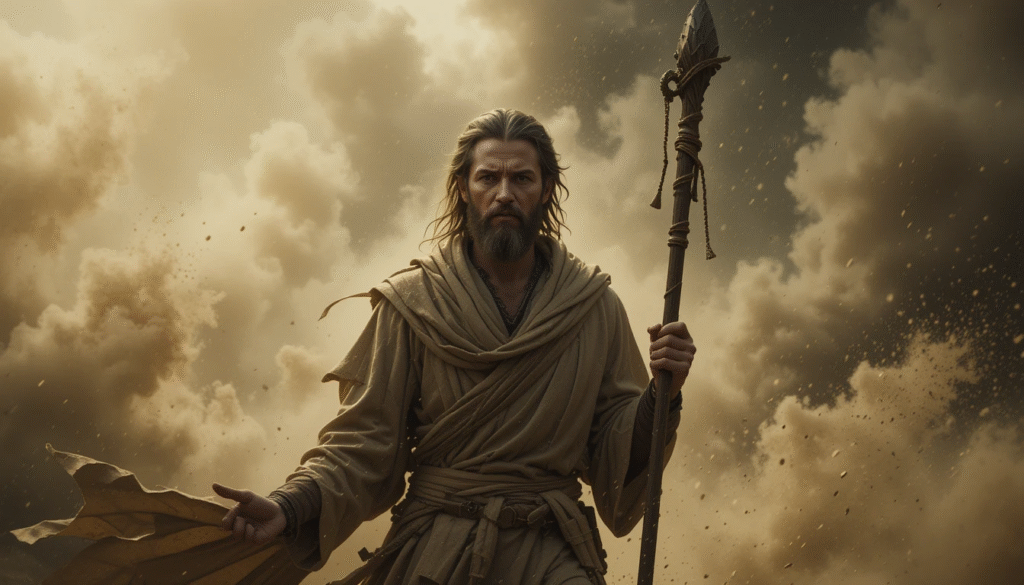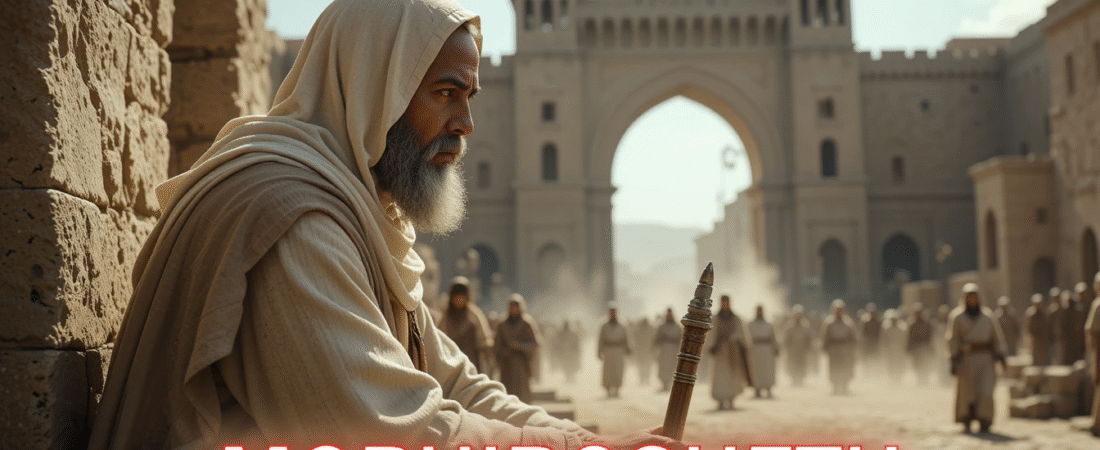In the shadows of biblical giants like David and Solomon, some figures remain nearly hidden—yet their stories shine with grace and meaning.
One such figure is Mephibosheth, the son of Jonathan and the grandson of Saul.
His name may be hard to pronounce, but his life paints a portrait of brokenness met with mercy.
Born into royalty, dropped into disability, and finally restored to dignity by a king’s promise—Mephibosheth’s journey reflects deep truths about loyalty, identity, and divine favor.
This blog uncovers who Mephibosheth was, what he endured, and why his story matters even today.
Who was Mephibosheth in the Bible?
Mephibosheth was the son of Jonathan and the grandson of King Saul.
He was born into Israel’s royal family, a child of both privilege and promise.
After the deaths of his father and grandfather at Mount Gilboa (1 Samuel 31:2), Mephibosheth’s life took a tragic turn.
His name is first introduced in 2 Samuel 4:4, where we learn he was crippled as a child.
Despite his noble bloodline, Mephibosheth lived much of his life in obscurity.
He did not ascend to power after Saul’s death.
Instead, he became a symbol of weakness and misfortune.
His name—meaning “from the mouth of shame”—perhaps reflected how others viewed him.
Still, his life was not forgotten.
Years later, David, bound by love for Jonathan, would seek him out to show him kindness.
What happened to Mephibosheth after Jonathan died?
After Jonathan died in battle alongside Saul, the royal household fell into chaos.
Fearing retribution from David, many fled or hid.
Mephibosheth was only five years old when the news of their deaths reached his home.
In the panic, his nurse fled with him.
Unfortunately, in her haste, she dropped him, and he became crippled in both feet (2 Samuel 4:4).
This injury defined the rest of his life.
Without a throne, and with physical limitations, Mephibosheth vanished from public life.
He was taken to a place called Lo-debar, a barren land that symbolized his fallen state.
He likely lived in fear, hidden from the new king, uncertain of his future.
But David’s loyalty to Jonathan would one day change everything.
How did Mephibosheth become crippled?

Mephibosheth became crippled during a moment of crisis.
The Bible records in 2 Samuel 4:4:
“Jonathan, son of Saul, had a son who was lame in both feet. He was five years old when the news about Saul and Jonathan came from Jezreel. His nurse picked him up and fled, but as she hurried to leave, he fell and became disabled.”
This injury wasn’t his fault, but it shaped his entire life.
In ancient Israel, physical disabilities often resulted in social exclusion.
Mephibosheth’s fall was both literal and symbolic—he fell from royalty into rejection.
He was a child of a king, yet lived like an outcast.
Still, the fall that seemed to end his future would later become the setup for grace.
Why did King David show kindness to Mephibosheth?
David’s kindness to Mephibosheth wasn’t random—it was rooted in covenant.
David and Jonathan, Mephibosheth’s father, had sworn loyalty to each other (1 Samuel 20:14–17).
Jonathan asked David to protect his descendants, even after Saul’s dynasty ended.
Years after taking the throne, David remembered that promise.
He asked in 2 Samuel 9:1:
“Is there anyone still left of the house of Saul to whom I can show kindness for Jonathan’s sake?”
Upon discovering Mephibosheth, David brought him to Jerusalem.
Not to judge or execute, but to restore and bless him.
This was more than kindness—it was covenantal love in action.
David’s actions reflect how God shows mercy to the broken for the sake of His promises.
Where did Mephibosheth live before meeting David?
Mephibosheth lived in a place called Lo-debar before David called for him.
Lo-debar means “no pasture” or “no word,” a desolate region beyond Jordan.
It symbolized isolation, emptiness, and exile.
This was where a fallen prince lived—a royal heir turned refugee.
2 Samuel 9:4 reveals:
“He is in the house of Makir son of Ammiel in Lo Debar.”
Makir was likely a wealthy man who provided Mephibosheth with shelter.
But even with protection, Mephibosheth lived in hiding—probably assuming David saw him as a threat.
Instead, David’s call would move him from Lo-debar to the king’s table.
What was David’s promise to Mephibosheth?

David’s promise to Mephibosheth was generous and unexpected.
In 2 Samuel 9:7, David said:
“Don’t be afraid… for I will surely show you kindness for the sake of your father Jonathan. I will restore to you all the land that belonged to your grandfather Saul, and you will always eat at my table.”
Mephibosheth feared judgment—but received restoration.
David returned Saul’s estate and elevated Mephibosheth to dine with him as one of his own sons.
This was a complete reversal of fortune.
From exile to honor. From fear to fellowship.
It was a promise rooted in relationship, not merit.
How did Mephibosheth respond to David’s kindness?
Mephibosheth’s response was humble and astonished.
He said in 2 Samuel 9:8:
“What is your servant, that you should notice a dead dog like me?”
This response shows how low he saw himself.
He didn’t feel worthy of royal treatment.
But David didn’t base his kindness on Mephibosheth’s self-worth—only on the covenant with Jonathan.
Even though Mephibosheth couldn’t walk or fight, David valued him.
He placed him at the king’s table permanently.
His humility made David’s kindness shine even brighter.
What happened to Mephibosheth during Absalom’s rebellion?
During Absalom’s revolt against David, Mephibosheth faced a moment of trial.
Ziba, his servant, told David that Mephibosheth stayed behind hoping to regain Saul’s kingdom (2 Samuel 16:3).
David, betrayed and exhausted, gave Mephibosheth’s land to Ziba.
But later, when David returned, Mephibosheth explained his side.
He said in 2 Samuel 19:26:
“My lord the king, since I your servant am lame, I said, ‘I will have my donkey saddled… so I can go with the king.’ But Ziba… betrayed me.”
His untrimmed beard and unwashed clothes proved his grief.
David, seeing his sincerity, divided the land between him and Ziba.
Mephibosheth answered:
“Let him take everything, now that my lord the king has returned safely.”
His loyalty was clear—not to power, but to David’s presence.
What lessons can we learn from the story of Mephibosheth?

Mephibosheth’s story teaches us about grace, loyalty, and identity.
- Grace: He received mercy not because of what he did, but because of a promise made before his birth.
- Loyalty: David honored his covenant with Jonathan, showing that true loyalty outlives circumstances.
- Identity: Mephibosheth was crippled, exiled, and ashamed, yet David called him worthy to sit at the king’s table.
His story mirrors our own.
We, too, are broken—yet God seeks us out, not to punish, but to restore.
Just as David did for Mephibosheth, God invites us to His table.
📚 Shop Our Favorite Ancient Texts
📖 The Book of Enoch 👉 https://amzn.to/4eCzsjj
📖 The Apocrypha Master Collection 👉https://amzn.to/3GvKWbM
📖 Ethiopian Bible in English (Complete 88 Books) 👉 https://amzn.to/45ToL9L
📖 The Book of Giants 👉https://amzn.to/44BDLqm
📖 The Dead Sea Scrolls Bible 👉 https://amzn.to/3Tp1ViV
📖 The book of Lilith 👉 https://amzn.to/4lA7Zkt
Also read more of our Insights here
